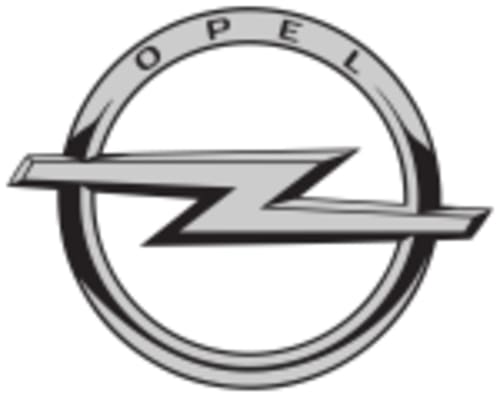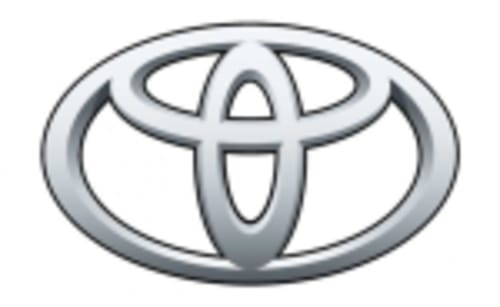Information and electric vehicles of the [object Object] brand
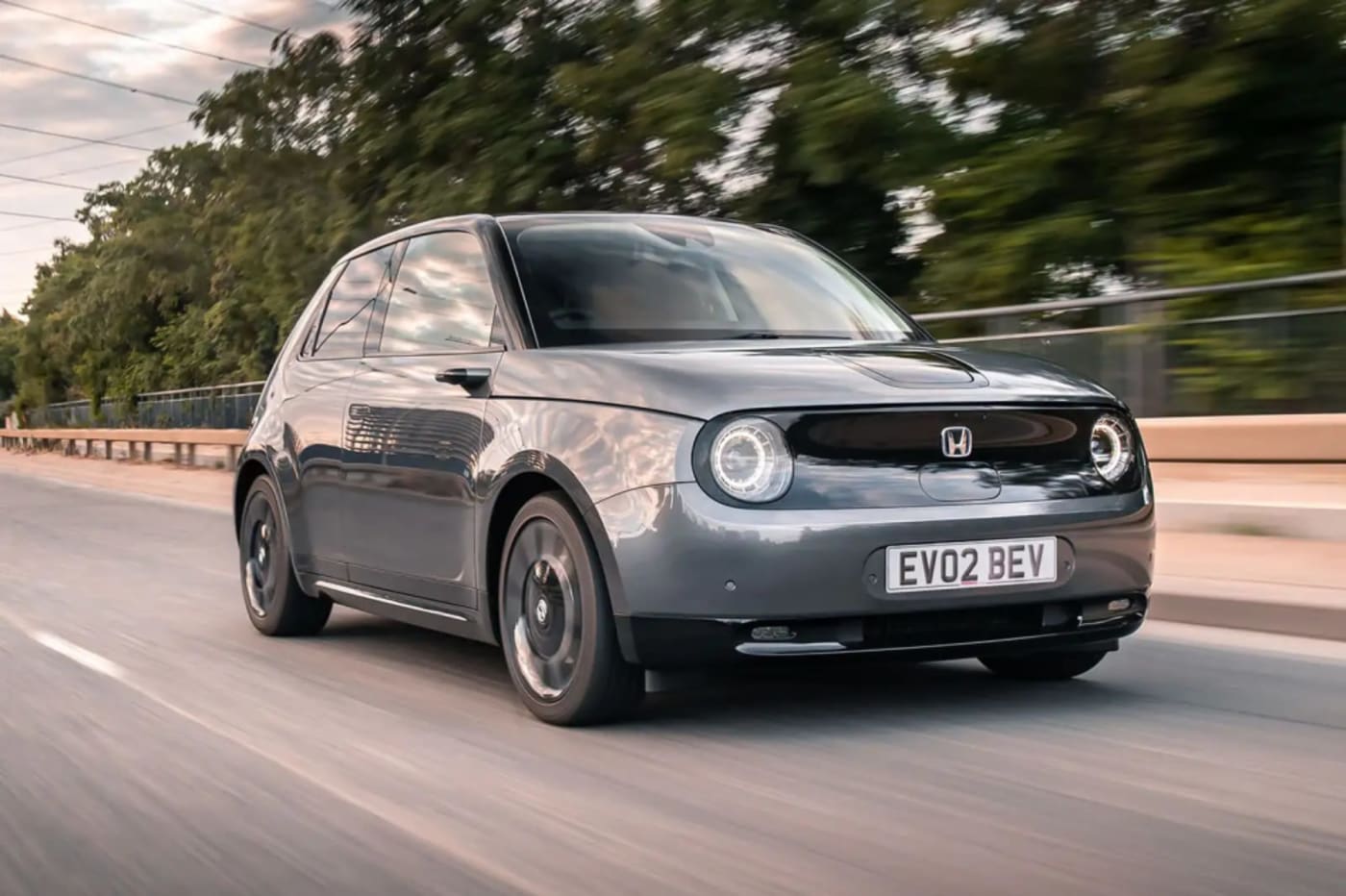
![[object Object] logo](https://res.cloudinary.com/donyiousk/image/upload/w_80/f_auto/c_scale,w_1400/v1/car/bkdalkxhlubgqjzhvmtp)
Honda
Electric: It's lit.

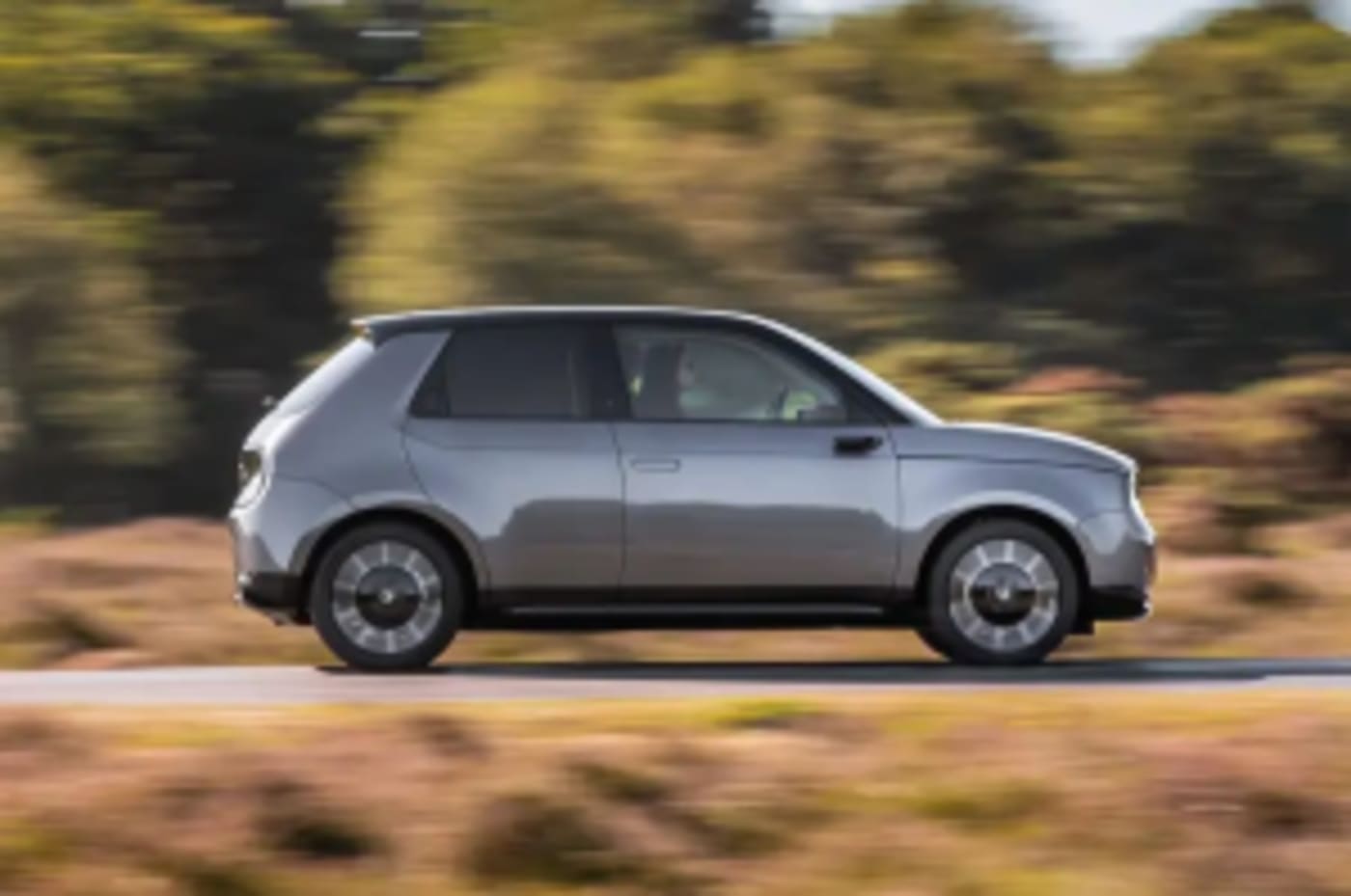

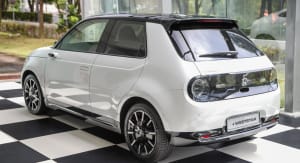

Honda electric vehicles
Honda is a Japanese automaker that has been at the forefront of the electric vehicle revolution. The company's first electric vehicle, the Honda e, was released in 2020. Honda has since released two more electric vehicles: the Prologue and the CR-V Hybrid.
The Honda e is a small electric car that is perfect for city driving. It has a range of up to 137 miles on a single charge and can accelerate from 0 to 60 mph in 8.0 seconds. The Honda e comes standard with a suite of advanced safety features, including automatic emergency braking, lane departure warning, and blind spot monitoring.
The Honda Prologue is a midsize electric SUV that is scheduled to be released in 2024. It is being co-developed with General Motors and will be built on GM's Ultium platform. The Prologue is expected to have a range of over 300 miles on a single charge and will be available in both front-wheel drive and all-wheel drive variants.
The Honda CR-V Hybrid is a hybrid electric SUV that was released in 2022. It has a range of up to 518 miles on a single tank of gas and can accelerate from 0 to 60 mph in 7.8 seconds. The CR-V Hybrid comes standard with all-wheel drive and a suite of advanced safety features, including automatic emergency braking, lane departure warning, and adaptive cruise control.
What makes Honda EVs different from other brands?+
Honda EVs do stand out from the crowd in a few key ways:
- Range: While not the absolute leaders, Honda EVs like the Clarity Electric and the new Prologue SUV offer respectable ranges of around 230-250 miles, which is more than enough for most everyday driving needs. This focus on practicality over chasing extreme range numbers sets them apart from some competitors.
- Hydrogen fuel cell option: Unlike most other EV brands, Honda offers the Clarity in both battery-electric and hydrogen fuel cell variants. This gives buyers more choice and caters to those who might have concerns about charging infrastructure or range anxiety.
- Focus on efficiency: Honda has a long history of building fuel-efficient cars, and this carries over to their EVs. The Clarity Electric, for example, is one of the most efficient EVs on the market, with an EPA rating of 114 MPGe.
- Reliability and safety: Honda has a reputation for building reliable and safe cars, and their EVs are no exception. The Clarity Electric has been praised for its reliability and has earned top safety ratings from the National Highway Traffic Safety Administration NHTSA.
- Driving dynamics: While not the sportiest EVs on the market, Honda EVs are still enjoyable to drive. They offer a comfortable and composed ride, and they handle well for their size.
Of course, there are also some areas where Honda EVs might not be the best choice for everyone. For example, their selection of EV models is still relatively limited compared to some other brands. Additionally, their charging speeds are not as fast as some of the latest EVs from Tesla and other competitors.
Overall, Honda EVs offer a compelling option for those looking for a practical, efficient, and reliable electric car. They may not be the most exciting EVs on the market, but they offer a well-rounded package that should appeal to a wide range of buyers.
Here are some additional points to consider:
- Honda's commitment to electrification: Honda has been investing heavily in electric vehicle technology for many years, and they are committed to expanding their EV lineup in the coming years. This means that Honda EV buyers can be confident that the brand is behind them for the long haul.
- The growing Honda EV charging network: Honda is partnering with other automakers to build a nationwide network of DC fast chargers, which will make it easier for Honda EV owners to take long road trips.
What are the different models of Honda EVs available?+
There are currently four Honda EV models available globally:
- Honda e: The Honda e is a small, urban hatchback that was first introduced in 2019. It has a retro-inspired design and a range of up to 137 miles 220 km on a single charge.
- Honda Clarity Electric: The Honda Clarity Electric is a mid-size sedan that was first introduced in 2017. It has a range of up to 226 miles 364 km on a single charge.
- Honda CR-V Hybrid: The Honda CR-V Hybrid is a hybrid SUV that was first introduced in 2019. It has a combined fuel economy of up to 40 mpg 17.8 L/100km.
- Honda Insight: The Honda Insight is a hybrid sedan that was first introduced in 1999. It has a combined fuel economy of up to 55 mpg 4.2 L/100km.
Honda is also expected to release a new EV model in 2024 called the Honda Prologue. The Prologue is an SUV that will be available with both front-wheel drive and all-wheel drive. It is expected to have a range of up to 300 miles 483 km on a single charge.
In addition to these four models, Honda also offers a variety of plug-in hybrid models, such as the Accord Hybrid and the Clarity Plug-in Hybrid. These models combine a gasoline engine with an electric motor for increased fuel efficiency and emissions reduction.
How much do Honda EVs cost?+
The cost of a Honda EV can vary quite a bit depending on the specific model and its features. Here's a quick breakdown:
Currently Available Models:
- Honda e: This city car starts at around £25,416.67 in the UK after a government grant) and $30,500 in the US (before any incentives. Prices can go up depending on trim level and options.
- Honda Prologue coming in 2024: This mid-size SUV is expected to start at around $48,000 in the US. Prices haven't been announced for other regions yet.
Factors Affecting Cost:
- Model and trim level: Different models will naturally have different base prices. Within each model, higher trim levels typically offer more features and performance, pushing the price up.
- Location: Prices can vary depending on the country or region you're buying in. Taxes and incentives can also play a role.
- Options and dealer markup: Additional features and accessories can add to the cost. It's also worth checking for any dealer markups before finalizing a purchase.
Helpful Resources:
- Honda UK Price List: Link
- 2024 Honda Prologue Preview on Kelley Blue Book: Link
- How Much Does It Cost to Own an Electric Car? Buerkle Honda blog): Link(https://www.buerklehonda.com/2023-honda-hr-v-near-minneapolis-mn/
Remember, these are just starting points. It's always best to check with a local Honda dealer to get the most accurate price for the specific model and options you're interested in. They can also tell you about any current incentives or promotions that might be available.
What is the range of Honda EVs?+
Honda currently offers two fully electric vehicles: the Honda e and the Honda e:Ny1. Their ranges vary depending on driving conditions and measurement standards:
Honda e:
- WLTP range: Up to 137 miles 221 km) with 16-inch wheels, 131 miles (211 km with 17-inch wheels.
- Real-world range: Estimated to be between 240 and 500 km depending on factors like weather, driving style, and road conditions.
Honda e:Ny1:
- WLTP range: Up to 256 miles 412 km.
- Real-world range: Typically between 335 km and 350 km, with potential for up to 500 km under ideal conditions.
It's important to remember that these are estimated ranges and your actual experience may vary depending on individual driving habits, weather, and other factors.
Here are some additional things to keep in mind:
- The WLTP Worldwide Harmonized Light Vehicles Test Procedure is a standardized test cycle used to measure fuel efficiency and CO2 emissions for electric vehicles. However, it doesn't always perfectly reflect real-world driving conditions.
- Real-world range can be significantly lower than the WLTP range, especially in cold weather or when driving at high speeds.
- Battery size and efficiency also play a role in range. The e:Ny1 has a larger battery and is generally considered more efficient than the e, which contributes to its longer range.
If you're considering buying a Honda EV, it's important to carefully consider your typical driving needs and compare the real-world range to your average commute or travel distances. You may also want to take a test drive to get a better feel for the car's performance and range in your specific driving environment.
How long does it take to charge a Honda EV?+
The charging time for a Honda EV depends on several factors, including:
Model: Different Honda EV models have different battery capacities. For example, the Honda e has a smaller battery than the Honda Clarity, so it will take less time to charge.
Battery level: If your battery is already partially charged, it will take less time to reach full charge than if it is completely empty.
Charger type: There are three main types of EV chargers:
- Level 1: This is the slowest type of charger, typically using a standard household outlet. It can take 12-24 hours or more to fully charge a Honda EV.
- Level 2: This is a faster type of charger, typically using a 240-volt outlet. It can take 4-8 hours to fully charge a Honda EV.
- DC fast charger: This is the fastest type of charger, and can typically charge a Honda EV to 80% in 30-45 minutes.
Other factors: Other factors that can affect charging time include the weather cold temperatures can slow down charging and the availability of fast charging stations.
Here are some examples of charging times for different Honda EV models:
- Honda e:
- Level 1: 16 hours
- Level 2: 10 hours
- DC fast charger: 30 minutes 80%
- Honda Clarity:
- Level 1: 24 hours
- Level 2: 6 hours
- DC fast charger: 30 minutes 80%
In general, you can expect to charge a Honda EV overnight using a Level 2 charger. If you need to charge quickly, you can use a DC fast charger, but they are not as readily available as Level 2 chargers.
What are the maintenance requirements for a Honda EV?+
Honda EVs, like most EVs, require different maintenance than traditional gasoline-powered vehicles. While you won't have to deal with oil changes, there are still important checks and upkeep to ensure your EV runs smoothly and efficiently. Here's a breakdown:
Regular checks every 6 months to 1 year:
- Battery: While EVs don't need oil changes, the battery is the heart of the car and deserves close attention. Honda recommends regular service checks to monitor its health, including temperature, charging behavior, and overall performance. These checks are typically under $100 and offer peace of mind.
- Tires: Proper tire pressure is crucial for optimal range and safety. Check your tire pressure regularly, including the spare, and adjust according to the recommended levels in your owner's manual. Regularly rotating and balancing your tires is also recommended.
- Brakes: Even though EVs use regenerative braking, the traditional friction brakes are still used for stopping. Get your brakes inspected and serviced according to the manufacturer's recommended schedule.
- Lights and fluid levels: Check all exterior and interior lights for functionality and replace any burned-out bulbs. Monitor windshield washer fluid and coolant levels and top them up if necessary.
Less frequent checks:
- Cabin air filter: Replace the cabin air filter every 12-24 months, depending on your driving conditions and air quality. This ensures clean air circulates inside your car.
- Wiper blades: Inspect your wiper blades for wear and tear, and replace them if they streak or leave the windshield uncleaned.
Additional points:
- Follow the manufacturer's recommended maintenance schedule: Your owner's manual will outline the specific service intervals and checks required for your Honda EV model. Adhere to this schedule for optimal performance and warranty coverage.
- Consider professional service: While some basic checks can be done at home, it's generally recommended to have your EV serviced by a qualified technician at an authorized Honda dealership. They have the training and equipment to handle the specialized components of an electric vehicle.
- Battery replacement: EV batteries, while quite durable, have a finite lifespan. Depending on your usage and charging habits, you may need to replace the battery sometime down the line. This can be a significant cost, but warranties and technological advancements are constantly improving.
Remember, even though EVs require different maintenance than gas-powered cars, it's still important to stay on top of it. Regular checks and upkeep will ensure your Honda EV runs smoothly, maximizes its range, and maintains its value over time.
Does Honda offer any tax credits or incentives for purchasing an EV?+
While Honda itself doesn't offer any unique tax credits or incentives for buying an EV, you can still take advantage of the federal tax credit for electric vehicles, which applies to several Honda models. Here's the breakdown:
New Honda EVs in 2023 and beyond:
- Eligible models: Currently, none of Honda's fully electric vehicles qualify for the full $7,500 credit due to exceeding the MSRP price limits. This includes the Honda Clarity Electric and the upcoming Prologue SUV.
- Pre-owned Honda EVs: Purchased in 2023 or later from a dealer for $25,000 or less, these can qualify for a credit of up to $4,000, which is 30% of the purchase price.
Honda hybrid models:
- These may not be full EVs, but some hybrid models like the Accord Hybrid and the CR-V Hybrid can still offer fuel savings and qualify for state-level incentives check your specific state!.
To ensure eligibility for any credit:
- Double-check the specific model and year: Requirements and rules can change annually, so verify your chosen Honda model qualifies for the applicable credit using resources like the IRS website or FuelEconomy.gov.
- Consider your income: Your modified adjusted gross income MAGI can affect the tax credit amount you receive. Check the income limitations for the specific credit you're aiming for.
Remember:
- The federal tax credit works as a reduction in your tax liability, not a direct cash payment. You can only claim it when you file your tax return.
- Additional state or local incentives for EVs might be available in your area. Research programs in your state or city for further potential savings.
What is the warranty on a Honda EV?+
Unfortunately, your question "What is the warranty on a Honda EV?" needs a bit more information to give you a specific answer. Honda offers various electric vehicles EVs) and hybrid electric vehicles (HEVs, each with slightly different warranty coverage. Additionally, specific warranty details can vary based on your location and the model year of the vehicle.
To give you the most accurate information, I need to know:
- Which specific Honda EV or hybrid model are you interested in? e.g., Honda Clarity, Honda CR-V Hybrid, Honda e
- Where are you located? e.g., United States, Canada, Europe
- Is the vehicle new or used? Knowing the model year would also be helpful
Once I have this information, I can provide you with the specific warranty details for your selected Honda EV or hybrid, including:
- Basic vehicle warranty: This typically covers most components of the vehicle for 3 years or 36,000 miles whichever comes first.
- Hybrid or electric battery warranty: This is usually more extensive than the basic warranty, often lasting for 8 years or 100,000 miles.
- Other specific warranties: Some models may have additional warranties for specific components, such as the powertrain or corrosion.
For a quick reference, here are some general warranty coverage details for popular Honda EVs and hybrids:
- Honda Clarity: 3-year/36,000-mile basic warranty, 8-year/100,000-mile hybrid battery warranty
- Honda CR-V Hybrid: 3-year/36,000-mile basic warranty, 8-year/100,000-mile hybrid battery warranty
- Honda e: 3-year/36,000-mile basic warranty, 8-year/100,000-mile electric battery warranty
However, these are just examples, and the actual warranty coverage for your specific vehicle may differ.
Where can I learn more about Honda EVs?+
There are many great places to learn more about Honda EVs! Here are a few suggestions:
- Honda's website: The Honda website has a dedicated section for EVs, where you can learn about their current models, future plans, and the benefits of driving electric. You can also find information on charging stations, incentives, and more.
- Your local Honda dealership: Your local Honda dealership is a great resource for learning about EVs. They can answer your questions, let you take a test drive, and even help you finance a new EV.
- Online reviews and comparisons: There are many great online resources for reading reviews and comparing different EVs. Some popular websites include Kelley Blue Book, Edmunds, and Consumer Reports.
- Electric vehicle blogs and forums: There are also many great blogs and forums dedicated to electric vehicles. These can be a great way to learn about the latest news and developments in the EV world, as well as to connect with other EV owners and enthusiasts.
Here are some specific things you might want to learn about Honda EVs:
- Current models: Honda currently offers two all-electric models: the Honda e and the Honda Clarity. The Honda e is a small, stylish hatchback that is perfect for city driving, while the Honda Clarity is a larger sedan that offers more range and cargo space.
- Future plans: Honda has announced plans to launch 30 new EVs by 2030. This includes a variety of SUVs, sedans, and trucks.
- Benefits of driving electric: There are many benefits to driving an electric car, including lower emissions, reduced fuel costs, and tax credits.
- Charging stations: There are a growing number of charging stations available, both at home and on the go. You can find charging stations using apps like PlugShare and ChargePoint.






